about
links
follow
Tongue Twisting Dinners, Session 2:
who owns, who belongs, who reigns, who cooks
@ an other world
Rotterdam
4/6/23
Tongue Twisting Dinners is a series of four monthly dinners hosted by Eathouse. They explore ways of initiating critical dialogue around contemporary urgencies by bringing people and culinary practice together. For each session Eathouse will host a different topic elaborated by guests whose research will guide the dialogue. The dinners will try out unconventional formats that attempt to dissolve the separation between host, guest and audience through inclusive prompts.
The conversation during the second Tongue Twisting Dinner focused on issues of food sovereignty and the belonging and recognition of cultures through local culinary practices. We invited guests Alaa Abu Asad, Escuela de Garaje (Santiago Pinyol) and Michael Lewis to elaborate on their experiences and knowledge and discuss the questions below:
How to keep alive recipes of oppressed communities and occupied lands?
How to avoid appropriation of local practices in times of forced migrations?
How to advocate for the land we live on and make space for local networks in the global trade market?
What are the methods for cultivating land in urban environments?
About the guests:
Alaa Abu Asad is an artist, researcher, and photographer. Language and plants are central themes through which he develops alternative trajectories where values of (re)presentation, translation, viewing, reading, and understanding can intersect. His work takes the form of writing, film, and interactive installations, in which he visually represents his research and explores the boundaries of languages.
Escuela de Garaje (The garage school) sparkled in Bogotá in 2013 as an informal program that improvises its structure every time it happens, depending on its subject and the context in which it will happen. The school needs minimal or no infrastructure endowment and we are interested in knowledge and tools that are considered irrelevant, of low quality or without official validity. In relationship terms the escuela relationship anarchy project, there are no official members. The general objective of the school is to collectively unlearn, freely and for free. Right we are working diasporically, from the kitchen as a place of situated study and researching about collective translation.
Michael Lewis is an accountant living in Rotterdam. He has a lifelong affinity with wholesome food and non produced orally transmitted folk music.
Graphic Design: Studio Lieneman
Photos courtesy: Nick Thomas.
Tongue Twisting Dinners has been kindly supported by Gemeente Rotterdam and CBK Rotterdam.






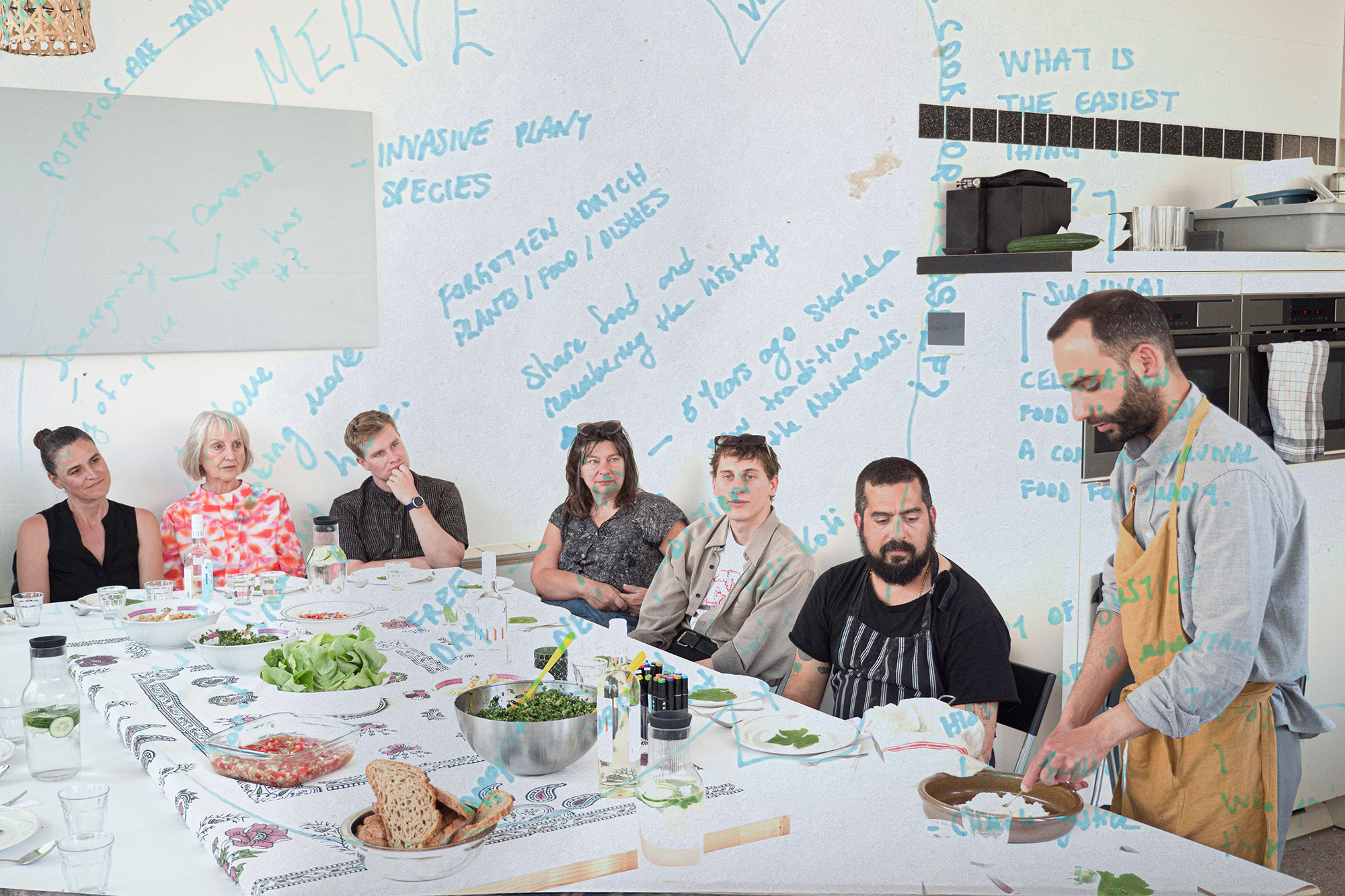

Tongue Twisting Dinners, Session 2: who owns, who belongs, who reigns, who cooks | DIGEST
Transcript of post dinner mail-out:
Last Sunday, 4th June, we gathered at an other world for the second session of Tongue Twisting Dinners. The conversation during the second dinner focused on issues of food sovereignty, belonging and recognition of cultures through local culinary practices. We invited guests Alaa Abu Asad, Escuela de Garaje (Santiago Pinyol) and Michael Lewis to elaborate on their experiences and knowledge.
The following mailout is an interpretive document of the dinner to be used as a guide to the discussion throughout the series. It is not intended to give a full picture of the conversation but to mark points in the discussion that felt important and possible avenues of enquiry and touchstones for our further sessions. It has been compiled from the generous contributions of the participants of the dinner.
Menu
Starter
Labneh, Tabbouleh & Hummus
Alaa shared Palestinian recipes of typical Levantine dishes, labneh, tabbouleh and hummus. Palestinian food often takes a long time to prepare however an even longer time is spent eating it together.
Sancocho
For the main, Santiago concocted a sancocho, a soup dish found across Latin America. Everyone brought “a root vegetable from their roots” to be added to the pot. The broth was made using WAKEAT miso paste, locally produced in Rotterdam.
Jalebi
Indian treats courtesy of Reshma’s Jalebi, Zuidwijk, Rotterdam.




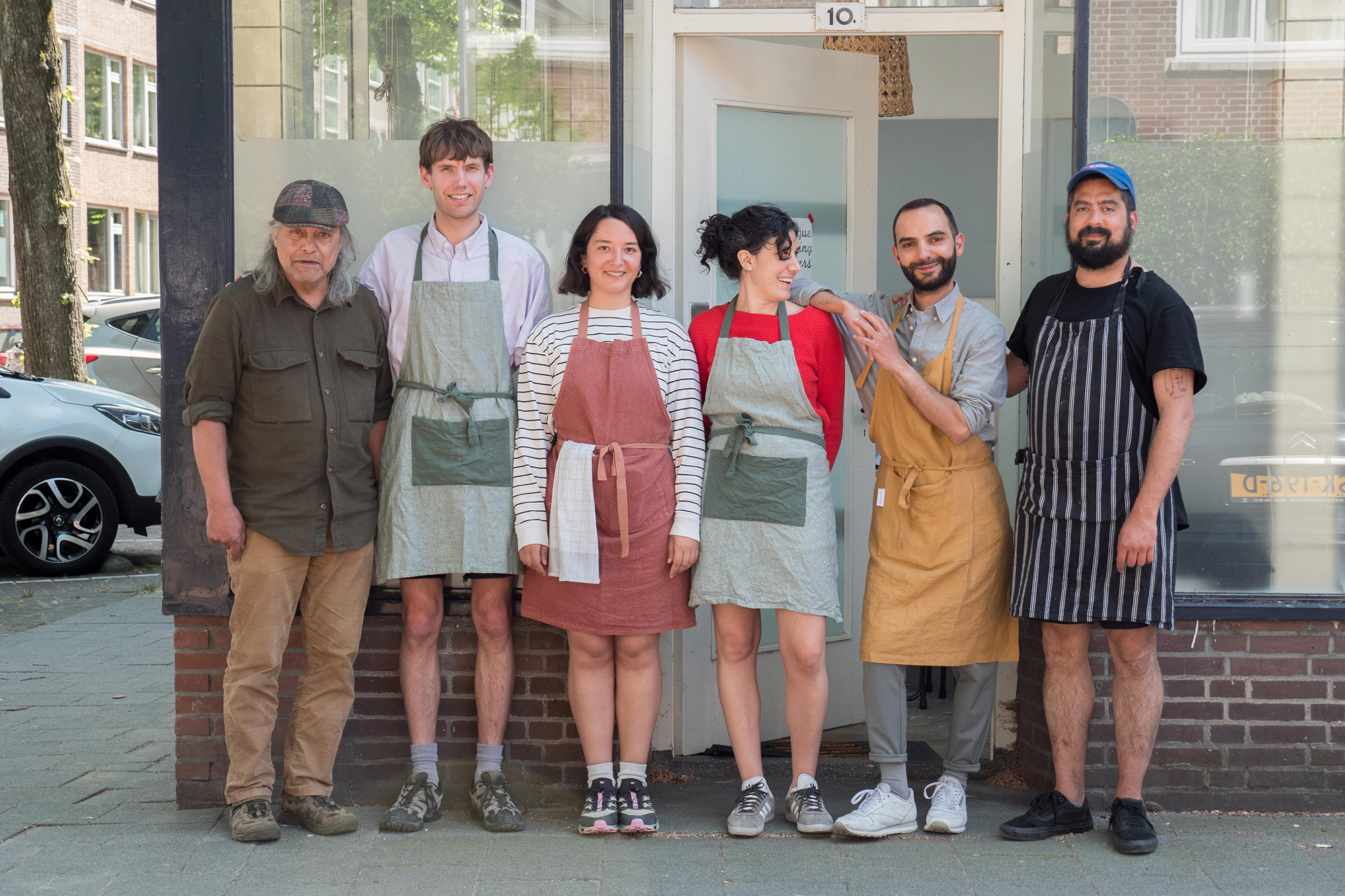
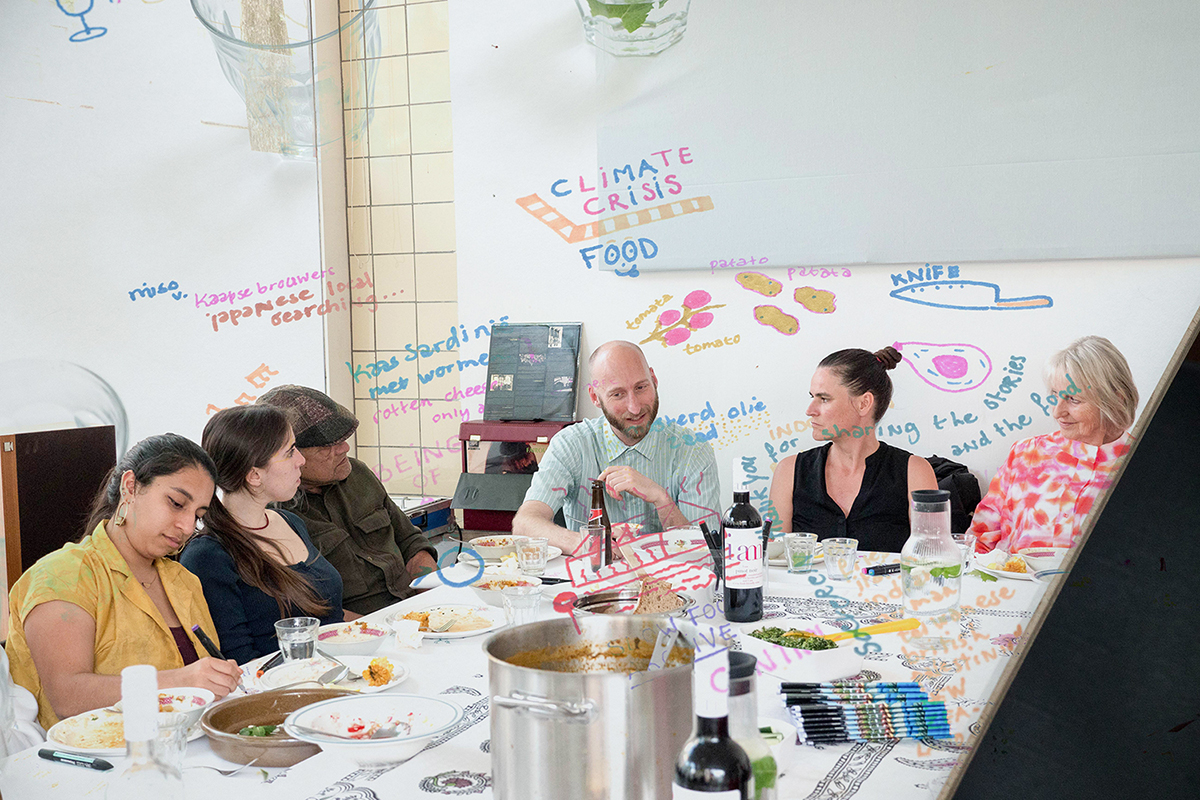

Further listening and reading:
Records were selected by Michael Lewis (DJ Hoekboud) and played during the evening:
Diablos Del Ritmo – (Record Title) The Colombian Melting Pot – Analog Africa 2012
Ella Fitzgerald – (Track) Black Coffee – Verve Records 1960
Kamuran Akkor – (Record Title) Kamuran Akkor – Pharaway Sounds 2015
Lord Tokyo – (Track) Buy Local – Caribana 1978
Michael O’Shea – (Track) No Journeys End – Dome Records 1982
Sabah – (Record Title) Sabah’s Cocktail – Parlophone Voix de L’Orient Series 1974
Texts, projects and publications suggested during the conversation:
Alaa Abu Asad, The Dog Chased Its Tail To Bite It Off (2020).
Alaa Abu Asad, Wild Plants of Palestine (2018).
Carlos Alfonso & Cristina Consuegra, Mundo mutous. La cocina como taller (2020).
Escuela de Garaje, Sancochotopia.
Felwine Sarr, Afrotopia (2019).
Laila El-Haddad, Gaza Kitchen (2021).
Michelle Teran’s garden project: @learn_inggrounds
Slow Food, De Ark van de Smaak in Nederland (2021).


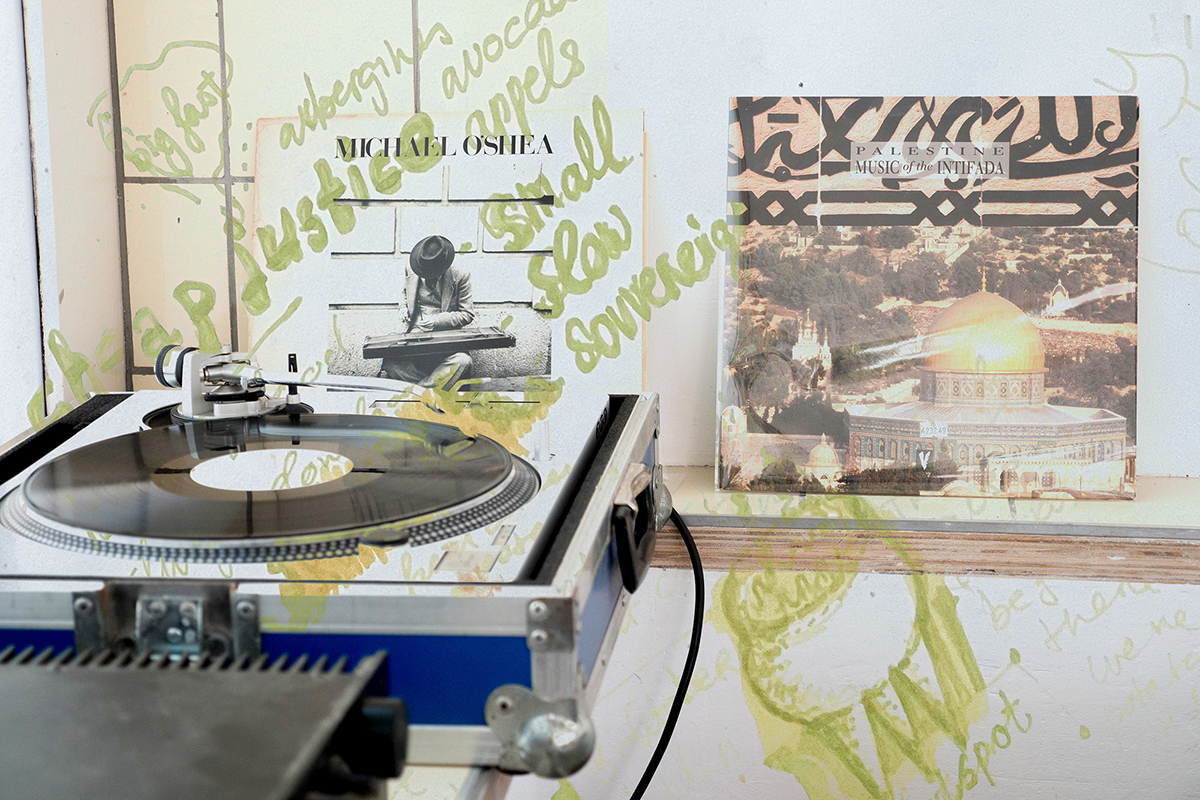


Food for thought:
Food sovereignty is a food system in which the people who produce, distribute, and consume food also control the mechanisms and policies of food production and distribution. We discussed this term and its relationship to nation state sovereignty, control and global food chains.
A large part of the conversation revolved around how we acknowledge where our food has come from, both geographically and culturally. In line with the ideas of food sovereignty this challenges corporate food regimes and opaque distribution networks. One suggestion was to produce more locally. However it felt important to think how this could be possible while also acknowledging the global world and its histories of food (and its people’s) migration.
In addition to this, ignoring something’s origin completely risks ignoring its reason for existing. It feels important to think historically about how cuisines have changed, which reminds us that food and culture is always fluid and not fixed.
What is the difference between appropriating and appreciating?
When thinking about how foods were appropriated through colonialism, we are often confronted with injustice, for instance, injustice of labour, climate, laws. How can we instead think from a position of justice, i.e. climate justice, labour justice? How can we advocate for justice whilst eating appropriated food such as tabbouleh or hummus outside of the Levant? How can we acknowledge struggle rather than neglect it or ignore where our food comes from?
Food sovereignty often prioritises the local and ‘culturally appropriate foods and practices’. A possible methodology to break open this purism is to queer something. We heard an example from the Freefilmers, a Ukrainian film collective who practised ‘queering’ their borscht. Queering something as traditional as borscht, a dish that is often connected to national identity, can be a way of creating new future traditions around food.
We talked about migration and leaving home as many of us were from outside the Netherlands. One of the most common migration survival tactics was to cook more recipes from home.
The term ‘immigrant intelligences’ came up. We talked about how the intelligences carried through and learnt during migration can bring possible solutions to the challenges of a changing climate. For instance, the intelligences brought from warmer climates will become more important for growing food in places like the Netherlands. Immigrant intelligences also bring an understanding of how to adapt to changing environments.
Indigenous knowledge was also discussed in the conversation. An example of this occurred in the Andes where people used terraced agriculture techniques to gradually acclimatise the potato (and other foods) from colder climates to warmer by gradually bringing the plants lower down the mountain.
Who gets to choose what is called ‘invasive’?
We talked about ‘invasive species’ and ‘non-native plants’. These species thrive in the change we live in. It is important to question what is ‘invasive’ and who is allowed to use this label. Rather than say something doesn’t belong we need to learn to coexist with what is already here. We heard of a recent meal at Mediamatic, Amsterdam where every dish was made with Japense Duizendkruid / Japanese knotweed commonly labelled as ‘invasive’.
The topic of sharing cuisines and understanding of the cultures they are part of continually returned. It was noted that mainstream changes are already happening, such as the Vrijheid’s Maaltijd (Freedom Meal) in the Netherlands where people can join an open dinner to discuss freedom. It was questioned whether this was an appropriation of Ketikoti, the celebration of the abolition of slavery in Suriname. During Ketikoti herheri is often eaten, a one pot dish that originated in Afro-Suranamese culture during times of slavery.
If globalisation was a soup, which one would it be and what would it taste like?
We talked about globalisation, imperialism and capitalism as “monsters” that digest situated cultures and cuisines. This referenced the Ottoman palace cuisine, that brought dishes from different regions of their empire to the royal court which would then be adopted by the public; and Imperial Russia’s expansion into Siberia, assimilating foods such as the pelmeni from indigenous cultures and making them national dishes.
We discussed the complex legal situation of Casu Martzu, a Sardinian cheese containing live maggots that has been banned by the Italian government and EU laws due to health concerns. A traditionally made cheese that derives from the sheep farming and pastoralism integral to Sardinian culture and the livelihoods of its farmers, Casu Martzu can only be sold illegally and cannot leave the island.
आनन्द (ananda) – Hindi/Sanskrit – the word has many meanings such as bliss and joy. It can be translated as ‘the joy of eating food together’.













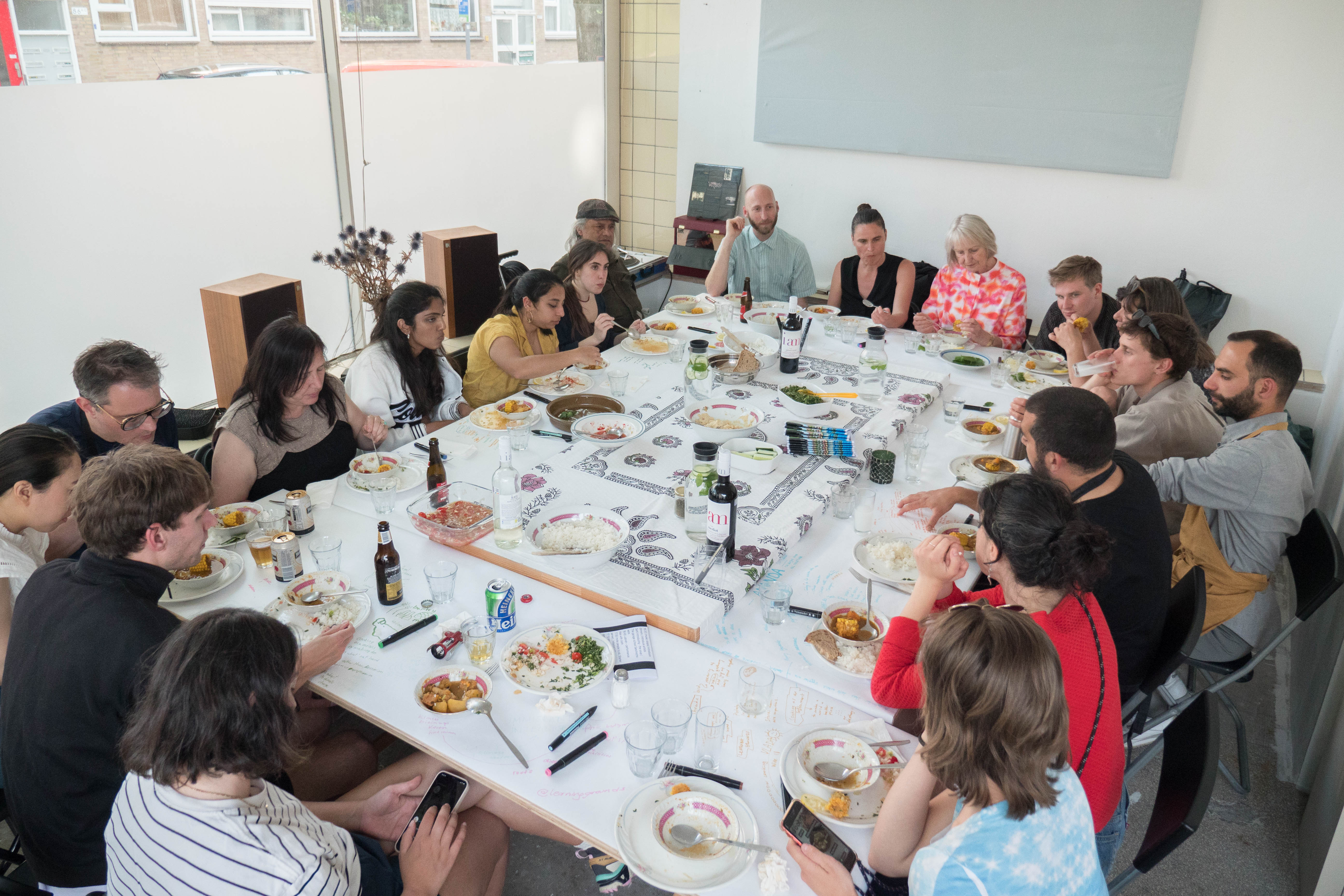
home
collab
home